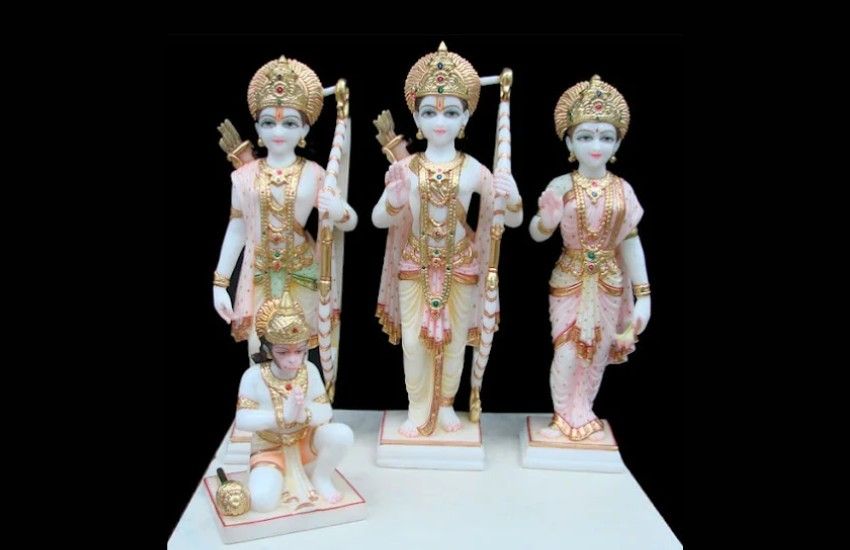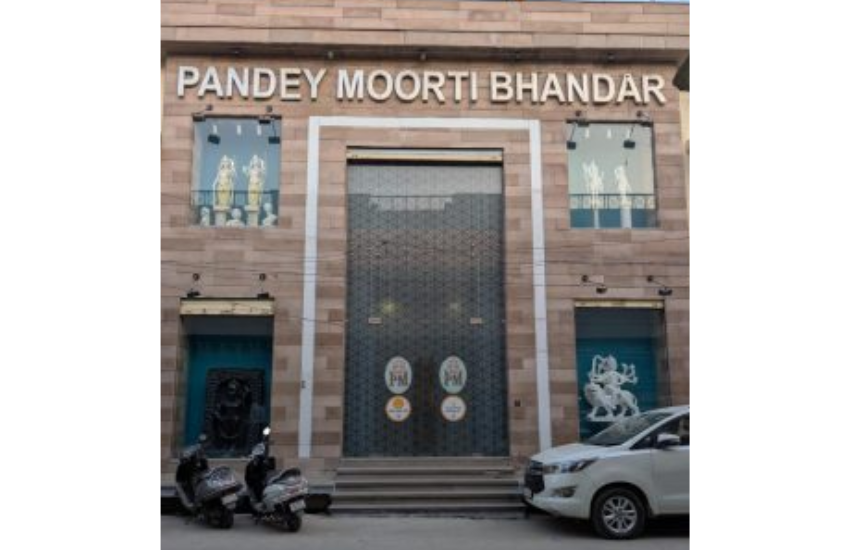The grand consecration of the Ayodhya Ram Mandir has drawn the attention of millions of devotees worldwide. At the heart of this spiritual marvel stand the sacred idols — majestic, divine, and filled with energy. As people bow in reverence before them, one common question emerges: “Where were these idols made?” The answer lies in the skilled hands of artisans from Jaipur, Rajasthan — a city known for its centuries-old marble carving tradition.
In this blog, we take you through the origin of the Ram Darbar Marble Statue and other divine figures placed in the Ayodhya Ram Mandir. From the selection of high-quality marble to the final polish that brings the idol to life, this is a journey shaped by devotion, tradition, and unmatched craftsmanship. These idols are not just stone—they are a spiritual embodiment, shaped by deeply spiritual processes.
Jaipur – The Birthplace of Sacred Marble Idols
The holy Ram Darbar Marble Statue installed in the Ayodhya Ram Mandir was meticulously handcrafted in Jaipur, the capital of Rajasthan. This city has long been known for its mastery in sculpting divine forms from marble. Jaipur’s artisans, or moortikars, follow age-old Vedic techniques passed down through generations to create idols that are not only aesthetically stunning but spiritually potent.

Among the many figures that grace the temple, the idols of Ram, Laxman, Sita, and Hanuman ji marble moorti are particularly revered. Their serene expressions, precise proportions, and vibrant presence are a testament to the exceptional skills of Jaipur’s sculptors.
The Process: From Stone to Divine Presence
Creating a deity’s idol is far more than craftsmanship—it’s a sacred ritual. It begins with selecting the right marble. Many artisans now opt for Recycled Marble Murtis, using sustainable practices to reduce waste while preserving spiritual sanctity. The chosen marble must be pure, free from cracks, and blessed before any carving begins.
Once the marble is selected, the artisan begins sketching the idol directly on the stone. With tools like chisels, hammers, and files, the rough shape begins to emerge. Each figure—whether it is a Radha Krishna murti, a Laxmi Narayan marble murti, or Ram Darbar—is sculpted following strict iconographic guidelines found in ancient scriptures.
Every stage of the process, from initial rough work to detailing the eyes, ornaments, and posture, is done with deep devotion. Before final delivery, a sanctification ceremony is conducted, purifying the idol and making it suitable for temple installation.
Why Jaipur is Trusted for Temple Murtis
Jaipur stands out as a hub for divine sculptures due to its combination of artistry, religious knowledge, and high-quality marble from nearby regions. The city is home to some of the most experienced Customize murti manufacturers in Jaipur, like Pandey Marble Arts, who have catered to temples not only in India but across the globe.
Here’s what makes Jaipur the ideal place for temple murtis:
-
Skilled sculptors who understand shilp shastra (ancient sculpture scripture)
-
Access to Makrana and white marble suitable for Ram Darbar Marble Statue
-
A long-standing culture of creating idols with precision and reverence
-
The rising use of Recycled Marble Murtis, reflecting a blend of tradition and responsibility
Beyond Ram Darbar – Other Sacred Installations
While the Ram Darbar Marble Statue holds the centerpiece in the Ayodhya temple, other idols also play important roles in its sanctity. The temple premises house the divine presence of Hanuman ji marble moorti, a protector and devotee of Lord Ram, often placed near the main sanctum.
Temples in the complex and nearby areas have also installed figures such as:
-
Laxmi Narayan marble murti – symbols of prosperity and divine protection
-
Radha Krishna murti – celebrating divine love and spiritual devotion
All of these have been created with the same level of discipline, care, and spiritual awareness by Jaipur’s artisans.
A Journey of Heritage, Devotion, and Precision
The journey of these murtis from Jaipur to Ayodhya is not merely physical—it’s spiritual. These idols are the culmination of thousands of hours of dedicated work, deeply embedded in sanatan dharma and Indian culture. Each idol embodies not just marble, but the divine presence it’s meant to represent.
With increasing demand for traditional yet personalized temple idols, Customize murti manufacturers in Jaipur like Pandey Marble Arts are ensuring that the spiritual needs of devotees are met with authenticity and artistic brilliance.
Pandey Marble Arts – Keeping Devotion Alive
As one of the leading and most trusted Customize murti manufacturers in Jaipur, Pandey Marble Arts takes immense pride in having contributed to such a prestigious spiritual landmark. With decades of experience in crafting everything from Radha Krishna murti to Laxmi Narayan marble murti, our goal has always been to bring devotion into physical form.
We specialize in:
-
Creating temple-grade Ram Darbar Marble Statues
-
Eco-conscious Recycled Marble Murtis
-
Custom statues that match traditional iconography with your space and preferences
Every idol is handcrafted under the guidance of senior sculptors and religious advisors to ensure every detail—from mudras to measurements—follows divine design.
Conclusion
The idols of the Ayodhya Ram Mandir are more than masterpieces—they are sacred, living symbols of India’s cultural and spiritual legacy. Handcrafted in Jaipur by master artisans using pure devotion and traditional methods, they bring the divine into tangible form. Whether it’s the powerful Ram Darbar Marble Statue, the serene Laxmi Narayan marble murti, or the loving Radha Krishna murti, each figure reflects centuries of heritage and divine inspiration.
For those seeking authentic, spiritually resonant idols, Pandey Marble Arts stands ready as a trusted Customize murti manufacturer in Jaipur, blending art, tradition, and faith into every creation.

